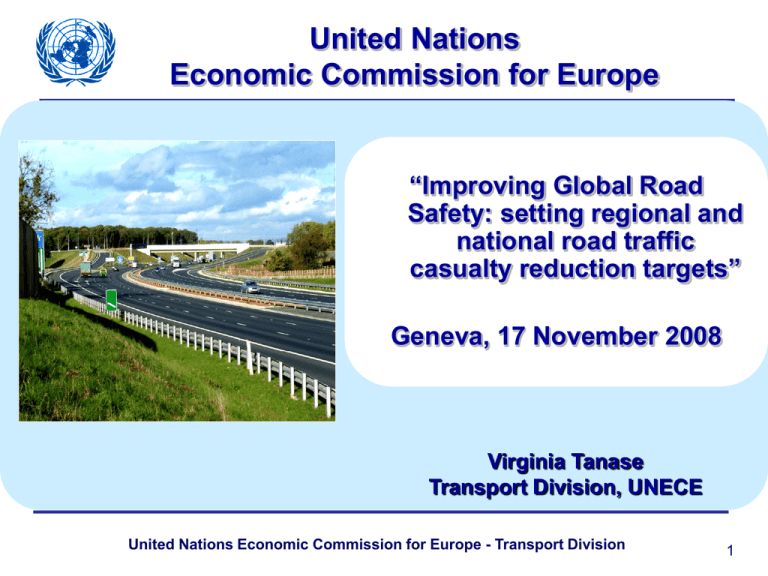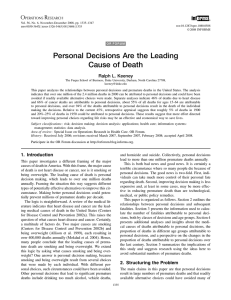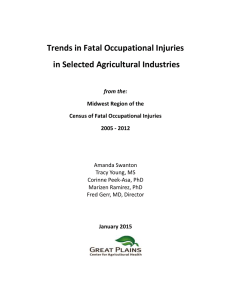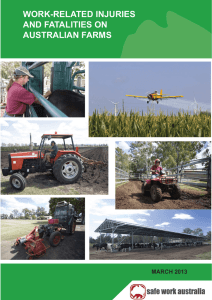United Nations Economic Commission for Europe
advertisement

United Nations Economic Commission for Europe “Improving Global Road Safety: setting regional and national road traffic casualty reduction targets” Geneva, 17 November 2008 Virginia Tanase Transport Division, UNECE United Nations Economic Commission for Europe - Transport Division 1 The project • Overarching objective: to assist low and middle income countries to develop regional and national road traffic casualty reduction targets and to provide them with examples of good road safety practice that could help them to achieve the targets selected by 2015 • Duration: to be carried out by the five UN regional commissions in 2008-2009 • Budget: $658,000 United Nations Economic Commission for Europe - Transport Division United Nations System • The UN Charter mitigates the adverse consequences of “regionalization” by prescribing: – a unified policy dictated by the General Assembly (Article 10), – a coordinating role exercised by the Economic and Social Council (Article 63), and – a unified direction exercised by the SecretaryGeneral (Article 97). United Nations Economic Commission for Europe - Transport Division Coherence and consistency The Executive Committee on Economic and Social Affairs (ECESA), created early 1997- membership includes the RCs • Aims to reduce duplication of effort and facilitate greater complementarity and coherence, to sharpen the contribution that each unit makes to the overall objectives of the Organization • The heads of UN entities consult with one another on work programmes as well as other substantive and administrative matters of collective concern, to identify and exploit ways of pooling resources and services so as to maximize programme impact and minimize administrative costs and more generally to facilitate joint strategic planning and decision-making. United Nations Economic Commission for Europe - Transport Division The project Main activity: organization of seminar(s) in each Regional Commission - ECA, ECLAC, ESCAP: 15 countries ECE: 7-10 countries ESCWA: 5-8 countries Beneficiaries: Ministries of Interior, Transport, Health and Education, NGOs active in road safety, and all road users United Nations Economic Commission for Europe - Transport Division The project Other activities include: - Information on interventions and road safety practices that brought reductions in road traffic injuries and fatalities - Bringing together countries with similar problems - Possibility of developing sub regional targets that could then feed into a regional target - Website, Advisory missions, Awareness campaigns, Report and African case studies United Nations Economic Commission for Europe - Transport Division Risk perception • shark = high risk • Fear of every beach holiday • 71 shark attacks in 2007, but… • 5-10 deaths a year • coconut = low risk • symbol of holidays, but… • about 150 deaths a year caused by falling coconuts Source: UN World Tourism Organization United Nations Economic Commission for Europe - Transport Division UNECE Region +USA United Nations Economic Commission for Europe - Transport Division Existing road safety targets Road safety strategies that include targets are more successful and really worked for developed countries Regional casualty reduction targets include: • European Union and European Conference of Ministers of Transport to reduce fatalities by 50% by 2010 and 2012 respectively • Additional steps possible: Belarus (-100 accidents/year), Russian Federation (-10% injured every year, on a province basis) • UNESCAP Ministers agreed to cut deaths by 600,000 by 2015 • UNECA Ministers of Health & Transport agreed to reduce road fatalities by 50% by 2015 United Nations Economic Commission for Europe - Transport Division Central Asia EU average number of deaths per million inhabitants is 93 with a cost of 0.42% of GDP, despite significantly higher traffic density and vehicle ownership than in Central Asia Source: GOPA-TRADEMCO United Nations Economic Commission for Europe - Transport Division Central Asia • Kazakhstan – road deaths have risen by 64% (2000-2005) – number of fatalities per 100 million vehicle km travelled= 3.5 (in 2004) compared to a figure below 1.0 in Europe – detailed road accident database – 2006-2015: “a wide-ranging set of measures is required to combat the heavy accident toll, including adequate institutional backup” Source: GOPA-TRADEMCO United Nations Economic Commission for Europe - Transport Division Central Asia • Kyrgyzstan – road deaths have risen by 46% (2000-2005) – Road Sector Development Strategy 2010 that the number of accidents will be reduced by 25% – road safety secretariat established in 2004 within the MoTC, with the assistance of ADB – modern system of surveillance and emergency interventions has been installed on the Bishkek-Osh corridor Source: GOPA-TRADEMCO United Nations Economic Commission for Europe - Transport Division Central Asia Commonly recognised reasons for deficient road traffic safety (1) • negligence of road traffic safety requirements by road users • low level of professionalism of drivers • poor road conditions (lack of funding for maintenance) • low risk awareness of non-motorised traffic and pedestrians • deficient road safety management Source: GOPA-TRADEMCO United Nations Economic Commission for Europe - Transport Division Central Asia Commonly recognised reasons for deficient road traffic safety (2) • poorly developed and maintained traffic guidance systems, even at the level of basic road signalling and marking • inappropriate design standards for bus stops, intersections, and protection of pedestrians and non motorised traffic • lack of regular and efficient controls of vehicle conditions • lack of well-established weather forecasting mechanisms Source: GOPA-TRADEMCO United Nations Economic Commission for Europe - Transport Division Expected consequences of the project • It is hoped that the benefits derived from the project will extend well beyond the life of the project: contributions are welcome! • The public becomes aware of the targets set and participate in achieving these targets • The good road safety practices presented for achieving the targets will remain valid for the foreseeable future • Setting targets is an exercise that may be repeated United Nations Economic Commission for Europe - Transport Division Expected/desirable outcome of the project • Setting of targets at national, sub-regional, regional levels and improved safety on the roads • Findings of the project communicated to/taken into account by the ministerial conference on road safety to be organized in November 2009 in Russian Federation • Argue in favour of the establishment of a global road safety target in the style of the Millennium Development Goals?... • Awareness and commitment, to ensure follow-up and sustainability United Nations Economic Commission for Europe - Transport Division United Nations Economic Commission for Europe Thank you for your kind attention! www.unece.org/trans United Nations Economic Commission for Europe - Transport Division 17




